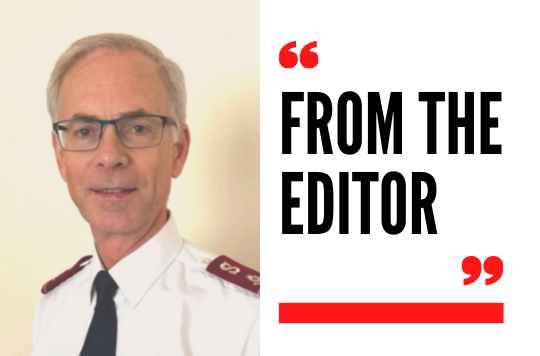Article of the week: Longing for relief
30 January 2021
GROANING CREATION
In the second of three articles, Major Howard Webber considers how human sinfulness impacts the planet
THERE’S an old story about a preacher who, driving through the countryside, came across a farm the like of which he had never seen. He felt compelled to stop and have a proper look at it. The old buildings looked amazingly well maintained, and the shrubs and flowers in the gardens around the house were a kaleidoscope of colour. His view of the avenue of trees leading up to the farmhouse, the vast field of ripening corn and adjoining pasture full of cattle was breathtaking.
As he stood there absorbing this beauty, the farmer happened to come along on his tractor. He pulled up beside the preacher, who turned to him and said: ‘God has blessed you with an amazing farm.’
‘Yes, he certainly has, and we’re grateful,’ the farmer replied. ‘But you should have seen it when he had it all
to himself!’
Although God placed Adam in the Garden of Eden to ‘work it and take care of it’ (Genesis 2:15), this was not a wearisome task. There was a partnership between him and nature. The adama (soil) was his willing subject, providing all he needed. It was so fruitful that it required little effort from him until the fateful day that God cursed it as a result of Adam and Eve’s sin. Then everything changed. Adam had thorns and thistles to contend with, and it required intense labour and sweat, as well as foraging in the field, to get the food they needed (see Genesis 3:18 and 19).
Never again would they or their descendants know the bountiful provision or the ease, safety, security and peace that they had once known in the Garden of Eden. Their sin also brought them death and decay, something it imposed upon nature too.
As Paul wrote in Romans 8, ‘creation was subjected to frustration, not by its own choice, but by the will of the one who subjected it’ (v20). He recognised that creation was in ‘bondage to decay’ (v21) and added: ‘We know that the whole creation has been groaning as in the pains of childbirth right up to the present time’ (v22).
Surely, as we look around the world today, none of us would deny that creation is groaning. I would suggest that it’s doing so more intensely than ever, as a result of man’s continuing sin; his abuse, misuse and exploitation of this wonderful world God created. According to the United Nations, we are altering the natural world at a rate that is ‘unprecedented in human history’.
The devastation of nature through human activity includes the destruction of natural habitats, intensive farming, logging, poaching, fishing and mining. We’ve polluted the sea with discarded waste and plastic, the land with chemicals and all sorts of waste, and the air with emissions resulting in global warming and rising sea levels. We’ve also littered space with countless pieces of debris, ranging from small scraps to defunct satellites.
Although biofuels were considered a good replacement for petroleum in reducing greenhouse gas emissions and sulphur pollution, in many places like Malaysia and Indonesia, forests have been destroyed to grow palm oil. Sumatran tigers and orangutans are facing extinction in Indonesia through loss of their habitat.
The World Wide Fund for Nature (WWF) and the Zoological Society of London state that the world’s animal populations plunged nearly 60 per cent between 1970 and 2014 due to overconsumption, population growth and intensive farming.
The threat of extinction isn’t confined to animal species. A recent report by the Royal Botanical Gardens at Kew (RBG Kew) says that 40 per cent of plant species are at risk. Professor Alexandre Antonelli, RGB Kew’s director of science, said: ‘We are living in an age of extinction. We’re losing the race against time because species are disappearing faster than we can find and name them.’
As the WWF manifesto notes, we are ‘the first generation to know we are destroying our planet and the last one that can do anything about it’.
Frustrated at having to suffer through no fault of its own, creation is groaning as it waits in eager expectation of the day when it will be liberated from its bondage, the day when it will share in ‘the freedom and glory of the children of God’ (Romans 8:21).
MAJOR WEBBER LIVES IN RETIREMENT IN BOURNEMOUTH
Next week…
‘That day draws ever closer’

From the editor
An early look at the editor's comment

Salvationist
Salvationist is a weekly magazine for members and friends of The Salvation Army

The War Cry
The War Cry is packed with features, reviews, mouth-watering recipes, puzzles and more.